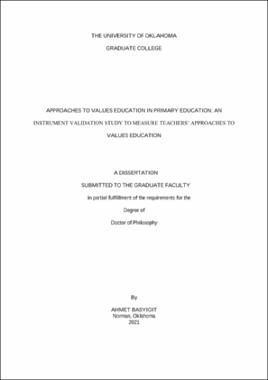| dc.description.abstract | In the literature, the concepts values education, moral education, and character education are used interchangeably. Academic studies under these titles can be seen in many countries and several developments have recently been made in numerous countries to include values education in formal education programs apart from the hidden curriculum. The contribution of academic studies to the process of integrating values education into the formal education program is undeniable. The emphasis of this study was on the approaches of teachers to values education within the scope of the education programs. When the literature is examined, it is observed that some measurement tools on individuals' value orientations have been developed and what values teachers prefer to teach have been studied. However, no measurement tool to assess teachers' approaches to values education could be found in the literature. The aim of this study was to develop a multidimensional measurement tool aiming to measure primary school teachers' approaches to values education.
The scale development processes recommended by DeVellis (1991) were followed in this study. Firstly, an item pool was created by preparing a three-dimensional conceptual model based on the conceptual definitions and classifications. A group of eleven experts specializing in various fields evaluated the items in the item pool. Following expert advice, some items were eliminated, and a pilot study with a group of primary school teachers (N= 52) was conducted to analyze the items. As a result of the pilot study, it was decided to modify some items with low-reliability scores, and the study was conducted with a total of 619 primary school teachers (PreK-5 grade) from three different states after the necessary modifications.
After removing the missing values and outliers from the data set, it was divided into two parts. The first part (N= 283) was subjected to exploratory factor analysis (EFA), and the second part (N= 284) to confirmatory factor analysis (CFA). In the study, the validity of the measurement tool (AVES) used to measure teachers' approaches to values education was determined as α= 841 for the traditional approach, .721 for the constructivist approach, and .887 for the critical approach. As a three-dimensional measurement tool comprised of nineteen items, AVES has shown to be a valid and reliable measurement tool. The results are limited to the characteristics of the study's sample group and the analysis programs used in the study. Therefore, AVES is open to test and improve the study's result by employing sample groups with diverse socio-cultural backgrounds.
Keywords: values education, approaches to values education, moral education, character education, teaching strategies in values education, classifications of approaches to values education. | en_US |
